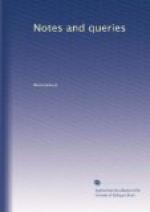“Noise” has never been used in the sense of the French word in this country. If derived immediately from the French, it is hardly probable that it should so entirely have lost every particle of its original meaning. With us it is either a loud sound, or fame, report, rumour, being in this sense rendered in the Latin by the same two words, fama, rumor, as News. The former sense is strictly consequential to the latter, which I believe to be the original signification, as shown in its use in the following passages:—
“At the same time it was noised abroad in the realme”
Holinshed.
Cleopatra, catching but the least noise
of this, dies
instantly.
Ant. and Cleo., Act i. Sc. 2.
Cre. What was his cause of
anger?
Ser. The noise goes, this.
Troil. and Cres., Act. i. Sc. 2.
Whether I or your correspondents be right, will remain perhaps for ever doubtful; but the flight that can discover a relationship between this word and another pronounced[1] as nearly the same as the two languages will admit of, and which gives at all events one sense, if not, as I think, the primary one, is scarcely so eccentric as that which finds the origin of a word signifying a loud sound, and fame, or rumor, in “nisus”; not even struggle, in the sense of contention, an endeavour an effort, a strain.
SAMUEL HICKSON.
St. John’s Wood, June 15, 1850.
[Footnote 1: I do not think it necessary, here, to defend my pronunciation of German; the expressions I now use being sufficient for the purpose of my argument. I passed over CH.’s observation on this subject, because it did not appear to me to touch the question.]
* * * * *
MORE BORROWED THOUGHTS.
O many are the poets that are sown By nature men endowed with highest gifts, The vision and the facility divine, Yet wanting the accomplishment of verse, Nor having e’er, as life advanced, been led by circumstance to take the height, The measure of themselves, &c.
Wordsworth’s Excursion, B. i.
This admired passage has its prototype in the following from the Lettere di Battista Guarini, who points to a thought of similar kind in Dante:—
“O quante nolili ingegni si perdono che riuscerebbe mirabili [in poesia] se dal seguir le inchinazione loro non fossero, o da loro appetiti o da i Padri loro sviati.”
Coleridge, in his Bibliographia Literaria, 1st ed., vol. i. p. 28., relates a story of some one who desired {83} to be introduced to him, but hesitated because he asserted that he had written an epigram on “The Ancient Mariner,” which Coleridge had himself written and inserted in The Morning Post, to this effect:—
“Your poem must eternal be
Dear Sir! it cannot fail;
For ’tis incomprehensible,
And without head or tail.”




